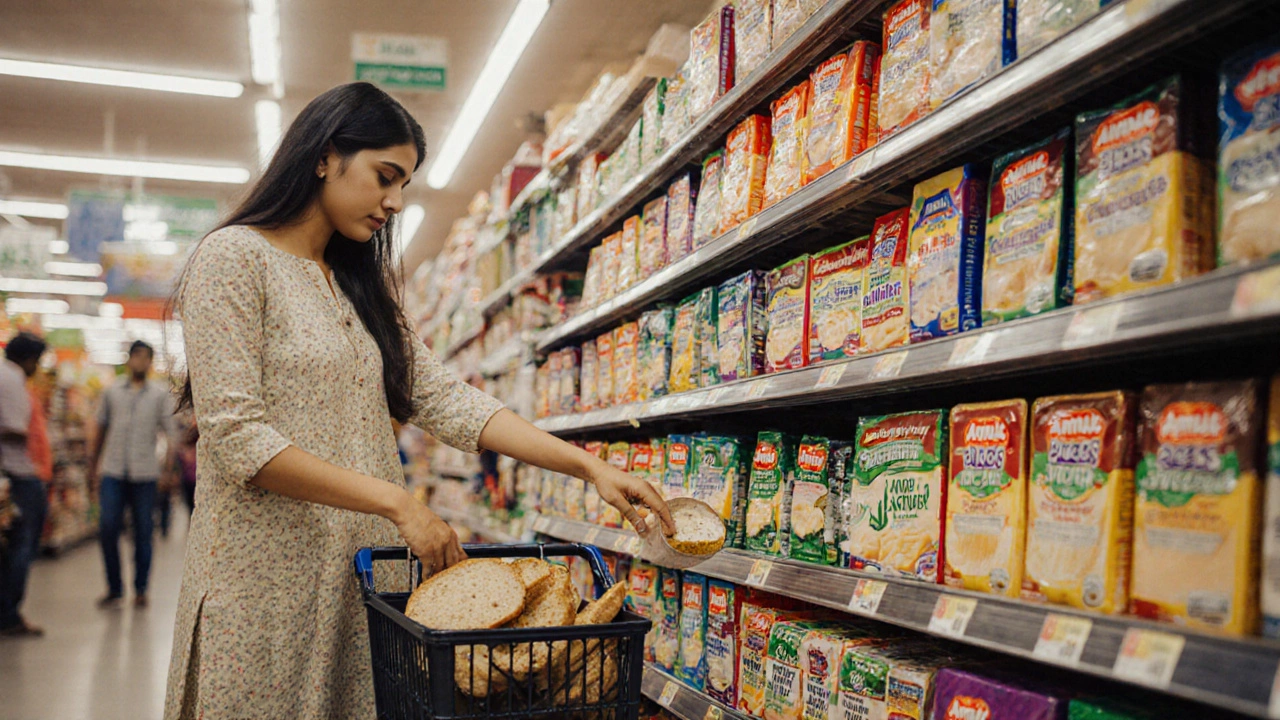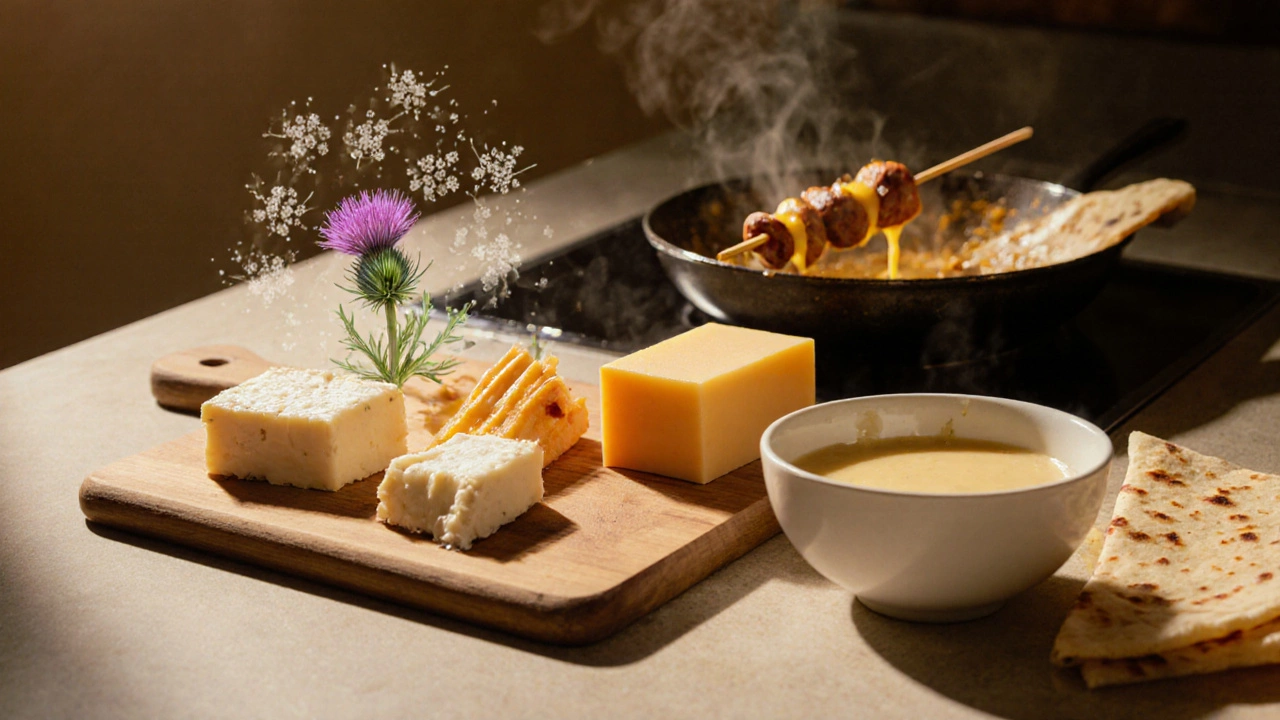Rennet-Free Cheese Finder
| Brand | Cheese Type | Rennet Source | Common Uses | Availability |
|---|---|---|---|---|
| Amul | Processed Slice (Cheddar style) | Microbial | Sandwiches, burgers, cheese toast | Big Bazaar, Reliance Fresh, Amazon India |
| Britannia | Cheddar Cubes | Microbial | Salads, pizza topping | DMart, BigBasket, Flipkart |
| Mother Dairy | Mozerella Sticks | Microbial | Fry-ups, kebabs, pasta | Mother Dairy outlets, Grofers |
| Nandini | Cheese Slices (Mild) | Microbial | Paratha stuffing, grilled cheese | Local dairy shops, Amazon |
| Green Valley | Plant-Based Cheddar | Vegetable | Vegan burgers, lasagna | Nature’s Basket, BigBasket |
| Gopal | Paneer-Style Fresh Cheese | Acid Coagulation | Paneer tikka, curries | Local supermarkets, online dairy stores |
Look for these indicators:
- Vegetarian Symbol: A green leaf or "VEG" on the packaging
- Ingredients: Check for "microbial enzyme," "vegetable rennet," or "rennet-free"
- Certification: FSSAI-approved vegetarian badge
- Brand Reputation: Established brands like Amul and Britannia use microbial rennet
Pro Tip: Call the manufacturer if unsure – most have English-speaking support lines.
Key Takeaways
- Rennet is an enzyme used to clot milk; many Indian cheeses use microbial or vegetable rennet instead of animal sources.
- Amul, Britannia, Mother Dairy, and Green Valley offer popular rennet‑free options.
- Look for labels saying “vegetarian‑friendly,” “microbial rennet,” or “lab‑grown rennet” to be safe.
- Rennet‑free cheese works well in Indian dishes like paneer tikka, cheese pulao, and sandwich fillings.
- Online marketplaces and large retail chains carry most of the brands, often at reasonable prices.
Rennet‑Free Cheese in India is a growing segment that caters to vegetarians, vegans, and anyone avoiding animal‑derived enzymes. Understanding what rennet is, spotting the right labels, and knowing which brands actually use non‑animal coagulants can turn a confusing grocery trip into a quick win.
What Is Rennet and Why Does It Matter?
Rennet is a set of enzymes that curdle milk, separating it into curds (solid) and whey (liquid). Traditional rennet comes from the stomach lining of young calves, which makes it unsuitable for most vegetarians. In the modern cheese industry, there are three main alternatives:
- Microbial rennet: produced by fungi or bacteria, completely free of animal tissue.
- Vegetable rennet: extracted from plants like thistle or fig leaves.
- Genetically engineered (recombinant) chymosin, which is chemically identical to animal rennet but created in labs without animal organs.
All three are considered vegetarian‑friendly, but only the first two are widely marketed in India as “no animal rennet.” Knowing the source helps you choose cheese that aligns with your dietary preferences.
Rennet‑Free Cheeses You Can Actually Buy in India
Below is a snapshot of the most common cheese varieties that are confirmed to use microbial or vegetable rennet. Availability is listed for major metro‑city chains and popular e‑commerce sites.
| Brand | Cheese Type | Rennet Source | Common Uses | Where to Buy |
|---|---|---|---|---|
| Amul | Processed Slice (Cheddar style) | Microbial | Sandwiches, burgers, cheese toast | Big Bazaar, Reliance Fresh, Amazon India |
| Britannia | Cheddar Cubes | Microbial | Salads, pizza topping | DMart, BigBasket, Flipkart |
| Mother Dairy | Mozerella Sticks | Microbial | Fry‑ups, kebabs, pasta | Mother Dairy outlets, Grofers |
| Nandini (Karnataka) | Cheese Slices (Mild) | Microbial | Paratha stuffing, grilled cheese | Local dairy shops, Amazon |
| Green Valley | Plant‑Based Cheddar | Vegetable (derived from soy) | Vegan burgers, lasagna | Nature’s Basket, BigBasket |
| Gopal | Paneer‑Style Fresh Cheese | Acid coagulation (no rennet) | Paneer tikka, curries | Local supermarkets, online dairy stores |
How to Spot a Rennet‑Free Label
Manufacturers rarely write “no animal rennet” on the pack, but there are a few reliable cues:
- Vegetarian Symbol: A green leaf or the word “VEG” often indicates microbial/vegetable rennet.
- Ingredient List: Look for “microbial enzyme,” “vegetable rennet,” or “rennet‑free” among the ingredients.
- Certification: Some products carry the “FSSAI‑approved vegetarian” badge.
- Brand Reputation: Established dairy brands like Amul and Britannia have publicly declared that all their processed cheeses use microbial rennet.
If you’re ever unsure, a quick call to the brand’s customer care (most have an English‑speaking line) can clear things up within minutes.
Using Rennet‑Free Cheese in Indian Recipes
Rennet‑free cheeses behave much like their conventional counterparts, but a few tweaks can boost flavor in Indian cooking:
- Melting Point: Processed slices (Amul, Britannia) melt cleanly, perfect for cheese‑filled parathas or cheesy naan.
- Texture: Mozzarella sticks (Mother Dairy) stay soft when sautéed - great for “cheese pakoras.”
- Seasoning: Add a pinch of chat masala or crushed black pepper to enhance the mild dairy taste.
- Acidity: When making a cheese‑based gravy, balance the tang of tomato puree with a dash of sugar to keep the cheese from clumping.
Here’s a quick “Cheese Masala Toast” you can make with any of the listed slices:
- Spread butter on a slice of whole‑grain bread.
- Top with a slice of Amul cheese, a sprinkle of chaat masala, and a drizzle of ketchup.
- Grill for 2‑3 minutes until golden and bubbly.
All the flavors stay vegetarian‑friendly because the cheese uses microbial rennet.

Where to Buy Rennet‑Free Cheese in India
Both offline and online channels have expanded their dairy sections in the last two years. Here’s a quick guide:
- Big Bazaar & Reliance Fresh: Carry Amul, Britannia, and Mother Dairy in bulk packs.
- Online Grocers (BigBasket, Grofers, Amazon India): Offer the full range, often with fast delivery to tier‑2 cities.
- Specialty Stores: Nature’s Basket and Foodhall stock Green Valley’s plant‑based line and imported cheeses that are also rennet‑free.
- Local Dairies: In states like Karnataka and Gujarat, regional brands like Nandini frequently label their cheese as vegetarian.
Prices typically range from ₹70 for a 200g pack of processed slices to ₹250 for premium plant‑based blocks.
Common Pitfalls and Pro Tips
Even with a clear label, you can run into surprises:
- Mixed‑Batch Packs: Some multi‑pack offers blend vegetarian and non‑vegetarian slices. Always check each wrapper.
- Expired Stock: Cheese past its “use‑by” date can develop off‑flavors, making it less pleasant even if it’s rennet‑free.
- Storage: Keep cheese refrigerated at 2‑4°C and wrap tightly to avoid moisture loss.
- Cooking Heat: High heat can cause processed cheese to become rubbery. Melt gently on low flame for best texture.
Pro tip: Store cheese in a small airtight container with a paper towel to absorb excess moisture - the cheese stays softer longer.
Frequently Asked Questions
Is Amul cheese really vegetarian?
Yes. Amul’s processed cheese slices use microbial rennet, which is completely free of animal enzymes. The packaging carries the green vegetarian symbol.
Can I use green‑valley cheddar in a traditional Indian recipe?
Absolutely. Green Valley’s plant‑based cheddar melts well, so it works in cheese‑filled parathas, pizzas, and even in creamy gravies when added at the end of cooking.
How do I confirm a cheese is made with vegetable rennet?
Check the ingredient list for phrases like “vegetable rennet,” “thistle extract,” or “plant‑based enzyme.” Brands that market vegan cheese usually highlight this on the front.
Is paneer considered a rennet‑free cheese?
Paneer is typically coagulated with lemon juice or acid, not rennet at all. So it’s naturally vegetarian and fits any rennet‑free diet.
What’s the price difference between animal and non‑animal rennet cheese?
In India, the gap is minimal. Processed slices from Amul and Britannia cost about ₹70‑₹120 per 200g pack, which is comparable to traditional cheese imports that use animal rennet.
